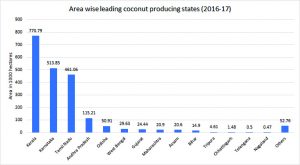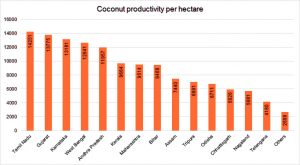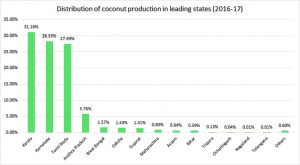Leading coconut producing states in India
Coconut is an important species mostly grown in humid tropical conditions. It is one of the main cash crop protecting millions of small and marginal farmers. In India Kerala, Karnataka, Tamil Nadu and Andhra Pradesh are the leading states in coconut farming. However, Kerala has a maximum area under coconut farming and contributing alone 31 per cent to total coconut production but Tamil Nadu has the highest per hectare nuts productivity. Tamil Nadu produced 13775 nuts per hectare where Kerala’s productivity was only 9664 nuts per hectare last year (2016-17).

Figure 1
Source: Horticulture Division, Dept. of Agriculture & Cooperation, Ministry of Agriculture & Farmers Welfare, Government of India.
The above figure 1 clearly indicates that Kerala has a maximum area under coconut farming with 770.79 thousand hectares followed by Karnataka and Tamil Nadu. Majority of the area (84%) under coconut cultivation contribute by Kerala, Karnataka and Tamil Nadu in India.
Figure 2
Source: Horticulture Division, Dept. of Agriculture & Cooperation, Ministry of Agriculture & Farmers Welfare, Government of India.Figure 2 shows (same as figure 1) that Kerala is leading coconut-producing state followed by Karnataka and Tamil Nadu. Kerala alone producing more than 30 per cent of the total coconut production in India. Kerala, Karnataka and Tamil Nadu collectively contribute to about 87 per cent to total coconut production.
Coconut productivity per hectare has opted altogether a different phenomenon from coconut farming area and coconut production. Figure 3 shows Tamil Nadu is more productive from Kerala and Karnataka. Tamil Nadu producing more than 14 thousands nuts per hectare whereas Kerala and Karnataka producing 9664 and 13181 coconuts nuts per hectare respectively.

Figure 3
Source: Horticulture Division, Dept. of Agriculture & Cooperation, Ministry of Agriculture & Farmers Welfare, Government of India.
Even Gujrat and West Bengal have higher productivity nuts per hectare then Kerala. Gujrat and West Bengal subsequently producing 13775 and 12641 nuts per hector separately.
India’s huge domestic market has been the main consumer of coconut and coconut products. The domestic price of coconut oil has so far been higher than the international price. Therefore, India has not had any significant role in world trade. However, with the increase in the price of edible oils at the global level, the difference between the domestic and international price has been substantially reduced.



